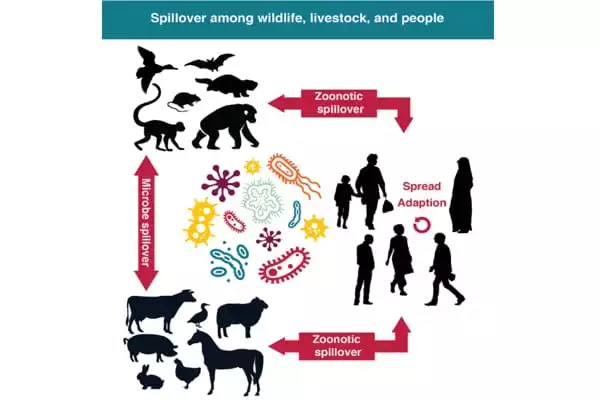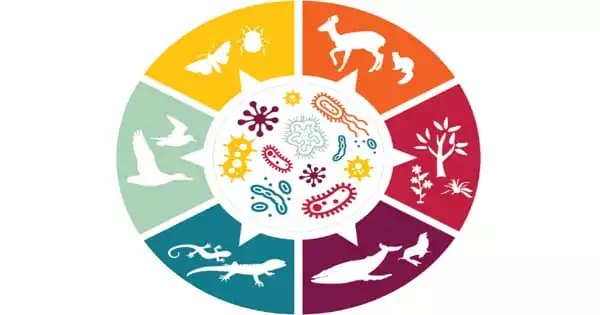According to a study conducted by epidemiologists, economists, ecologists, and biologists from 21 institutions, we could reduce the risk of future pandemics by investing as little as one-twentieth of the losses incurred so far from COVID in conservation measures designed to prevent the spread of zoonotic viruses from wildlife to humans in the first place. This includes efforts to train more veterinarians, build a global database on virus genomes, and put a stop to tropical deforestation and wildlife trafficking.
We have the option of paying now or paying much more afterwards. That’s the conclusion of a new peer-reviewed study published in the journal Science Advances, which compares the expenses of preventing a pandemic versus the costs of containing one.
“It turns out that prevention really is the best medicine,” said Stuart Pimm, co-lead author of the study and the Doris Duke Professor of Conservation Ecology at Duke University. “We estimate that investing as low as one-twentieth of the losses experienced so far from COVID towards conservation initiatives targeted to help prevent the transfer of these viruses from wildlife to humans in the first place might considerably reduce the likelihood of another pandemic.”
The report suggests that investing in programs to prevent tropical deforestation and international wildlife trafficking, halt the wild meat trade in China, and increase disease tracking and control in wild and domestic animals worldwide would be a good place to start.
Epidemics are becoming more common, larger, and spreading over more continents. Prevention is far less expensive than treatments. Preventing epidemics before they break out is the ultimate economic bargain, when compared to the costs and social and economic disruptions associated with attempting to control infections after they have already spread to humans.
Professor Stuart Pimm
The study’s authors highlight that COVID, SARS, HIV, Ebola, and many other viruses that have developed in the previous century started in wild settings and wild animals before spreading to humans. Tropical forest borders where humans have cut more than 25% of the trees for farming or other uses, as well as marketplaces where wild animals, dead or alive, are traded, are hotbeds for these animal-to-human viral transmissions.
“The simple truth is that until we stop harming the ecosystem and selling wild species as pets, meat, or medication, these illnesses will continue to spread. And, as the present pandemic demonstrates, controlling them is prohibitively expensive and difficult “Pimm stated. “COVID has been around for two years, and the remedy is still not working. Not enough individuals are vaccinated in the United States, where vaccinations are available and affordable, and not enough vaccines are distributed to other countries that cannot afford them.”

The new study, conducted by epidemiologists, economists, ecologists, and conservation biologists from 21 institutions, calculates that by investing just 5% of the estimated annual economic losses associated with COVID human deaths into environmental protection and early-stage disease surveillance, the risks of future zoonotic pandemics could be cut in half. This might help save approximately 1.6 million lives per year and cut mortality costs by approximately $10 trillion per year.
“We’re talking about tens of billions of dollars per year. The government has that type of money” Pimm explained.
One of the new study’s primary recommendations is to spend some of the money to train more veterinarians and wildlife disease biologists. Another important recommendation is to establish a global database of virus genomes, which may be used to identify the source of newly developing infections early enough to reduce or stop their spread, and, ultimately, to accelerate the development of vaccines and diagnostic tests.
The study’s co-lead authors were Aaron Bernstein of Boston Children’s Hospital and the Center for Climate, Health, and the Global Environment at Harvard T.H. Chan School of Public Health, and Andrew Dobson of Princeton University.
According to Dobson, the necessity to implement preventive actions as soon as feasible is becoming increasingly critical. “Epidemics are becoming more common, larger, and spreading over more continents. Prevention is far less expensive than treatments “Bernstein made the observation. “Preventing epidemics before they break out is the ultimate economic bargain” when compared to the costs and social and economic disruptions associated with attempting to control infections after they have already spread to humans.
The report was co-authored by researchers from 17 other universities, medical facilities, environmental charities, or government agencies in the United States, China, Brazil, South Africa, and Kenya.
People who live near animals in high-risk locations should be supplied with health treatment. This would aid in the prevention of illness epidemics before they spread further. It states that standard techniques are required so that pandemic prevention becomes mainstream over the world. The authors argue that preventing outbreaks would be hundreds of times cheaper than dealing with the repercussions.
It urges people to stop intruding on natural territory and to eat less meat because the sector facilitates human-to-human interaction with new viruses. According to the research, governments must act together to avoid future pandemics and to quickly handle epidemics.
















